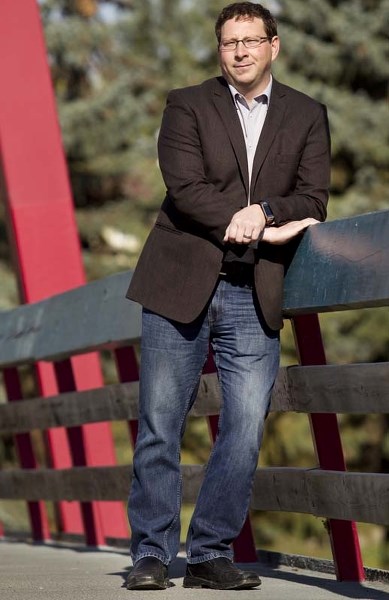In his early 20s, Reid Johnson did not believe in paying it forward.
It was a philosophy he and his father would argue about. But Johnson was just starting to build his own life and career, and thinking like a socialist was the farthest thing from his mind, he says.
Today, he volunteers a majority of his free time to charities. When you ask him what changed, he smiles a little and then shrugs his shoulders.
"You mean when did I go from being a jerk to now I try to be nice?" he asks. "I don't know. What do you think?"
Dressed casually in a dark sweater over a light-coloured button up shirt, his hair slightly out of place, Johnson is not one to stick out in a crowd. We almost missed each other in the coffee shop we set up for the interview.
He's a man "much too humble" to toot his own horn, one of his co-workers told me when I first called to set up the meeting.
But he agrees to the interview because it might "give some recognition" to the organizations he feels passionate about, he says.
"Isn't that awkward?" he wonders nonetheless. "Just asking questions to strangers."
Giving back
Johnson is in his mid-thirties. He has three children and a wife, and has spent most of his life in St. Albert.
He wanted to be a mechanic once, he tells me. Then he apprenticed as a machinist but eventually settled on communications technology.
He still works as the crew chief for a racecar on his days off.
Today, he owns a small company, Core Network Solutions, which he started in 2003. The business provides wireless network and security systems for airports and companies such as Disney and Rocky Mountain Equipment.
They serve a niche market, so they are less well known, he says. It was pure coincidence that his work led him to volunteering, he adds.
Johnson says he met the founder of Little Warriors, a national charitable organization that focuses on the education and prevention of child sexual abuse, at a meeting with her marketing firm in 2012.
Describing Glori Meldrum as "just so contagious," he went to a fundraising party for the organization. By the end of the night, he had offered up his expertise to supplying the IT-services to The Be Brave Ranch.
The ranch, a new treatment facility to help children who have been sexually abused, is expected to open this year, outside of Edmonton.
"I have three little kids of my own and I can't imagine that happening to them," he says.
"It's just good to see that there is some organization that helps people turn their life around. Right? Right!"
Since joining the Warriors, Johnson has expanded his charitable network.
He's become involved with the Alberta Association for Community Living, the Good Samaritan Society, and the St. Albert chapter of the Canadian Progress Club.
They share "a similar mentality" about helping children in the community, he says.
He's also on the board of directors for Kids Up Front Edmonton and is considering volunteering with yet another organization, which also works with youth.
"I am not sure. It's something about helping kids," he says. "I didn't grow up rich, I lived through the '80s … We didn't live in poverty, I was never hungry, but I can identify with kids that aren't well off."
Becoming charitable
He didn't start off charitable either, he says.
Living through the recession gave him a lot of drive. He was eager to earn his own money but he had no patience for those who didn't, he says.
Why pay health care for a homeless person, he used to argue with his father.
"It's not that I was a bad person. I just didn't understand how the world really works," he says. "That homeless guy is probably there because either he has a mental health issue or he lost his job."
Toward the end of our conversation, I pick his brain about the moment that changed him. But Johnson can't settle on one.
He says that it was likely the arrival of his children – seeing how "everything you do impacts on how you turn out."
Long before that he also had a friend whose uncle died in the cold after being evicted from his home. Experiencing that progression into poverty and despair in person, it changes your perception, he says.
It's simply a matter of growing up, he concludes.
"I don't see myself as a successful person but I am starting to be more established in business," he says. "So I can start to shift my focus. It's not all about me. It's not all about my family. It's also about helping other people."




